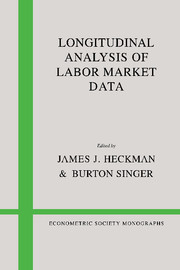Book contents
- Frontmatter
- Part I. Econometric studies
- 1 Heterogeneity, omitted variable bias, and duration dependence
- 2 Social science duration analysis
- 3 Interpreting empirical models of labor supply in an intertemporal framework with uncertainty
- 4 Alternative methods for evaluating the impact of interventions
- Part II. Statistical studies
- Part III. Sociometric studies
- Name Index
- Subject Index
1 - Heterogeneity, omitted variable bias, and duration dependence
Published online by Cambridge University Press: 05 January 2013
- Frontmatter
- Part I. Econometric studies
- 1 Heterogeneity, omitted variable bias, and duration dependence
- 2 Social science duration analysis
- 3 Interpreting empirical models of labor supply in an intertemporal framework with uncertainty
- 4 Alternative methods for evaluating the impact of interventions
- Part II. Statistical studies
- Part III. Sociometric studies
- Name Index
- Subject Index
Summary
This chapter will discuss models for longitudinal data in which a sample of individuals or firms is followed over time. A primary advantage of such data is that they allow us to test and relax assumptions that are implicit in a cross-sectional analysis. Section 1 considers the main issue in the context of the familiar linear model. Here a basic specification test is a comparison of a regression based on changes with a cross-sectional regression. This test is put in a general framework that relates it to tests for strict exogeneity in time series analysis. We show that the failure of strict exogeneity may be due to heterogeneity, which suggests a reformulation in which there is a mixture of strictly exogenous processes. The assumption of strict exogeneity in a mixture model is itself testable, and such tests should be routine whenever the standard analysis-of-covariance estimator is used.
The treatment of heterogeneity leads to the statistical problem of incidental parameters. Since the typical panel has a large number of individuals observed over a short time period, the relevant limiting distributions have the number of individuals increasing but not the time dimension. If we allow for individual specific parameters, then maximizing the joint likelihood function does not in general provide a consistent estimator of the parameters common to all individuals. We discuss procedures that are valid in general, based on conditional, marginal, and posterior likelihood functions.
- Type
- Chapter
- Information
- Longitudinal Analysis of Labor Market Data , pp. 3 - 38Publisher: Cambridge University PressPrint publication year: 1985
- 129
- Cited by



